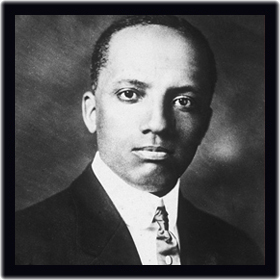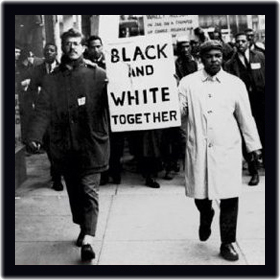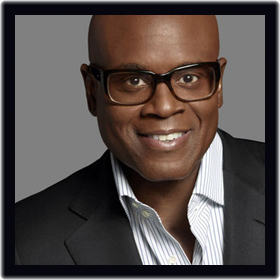-
In Celebration Of Black History Month 2013 - What's Changed? What Hasn't?
February 19, 2013
Have an opinion? Add your comment below. Not only is America's face changing, so are its dreams. Affirmative action has opened some doors and some of us plowed though, ambitious, determined and prepared. For a few, the dream has been achieved. But can they ... can we secure the dream for our children?
-
This is the third chapter in our current series for Black History Month 2013. Before we get into what has changed and what hasn't, we wanted to review the reason for and answer some questions about why we celebrate Black History Month. First of all, why February? February is a month that has enormous significance in Black American history.

The month of February was selected by Carter Goodwin Woodson, a noted historian, publisher and pioneer in American Black history. Woodson was born to parents who were former slaves. He spent his early childhood working in the Kentucky coal mines and enrolled in high school at age 20. He graduated within two years and later went on to earn a PhD. from Harvard.
As an accomplished scholar he was disturbed to find in his studies that history books largely ignored the Black American population and when blacks did figure into the picture, it was generally in ways that reflected the inferior social position they were assigned at the time. It was and is America's changing face.
Woodson selected February for several reasons. First it is in celebration of two historical figures, both of whom had a great impact on Black history: Abraham Lincoln and Frederick Douglass. There were other significant people and events that took place in February: A noted civil rights leader and founder of the NAACP, W.E.B. Dubois, who was born on February 23rs, 1868. The 15th Amendment to the United States Constitution was passed on February 3rd, 1870, giving Blacks the right to vote. The first Black senator, Hiriam R. Revels, took office on February 25th, 1870. Malcolm X, the fiery militant leader who promoted Black Nationalism, was shot and killed by Black Muslims on February 21st, 1965.
Now let's look at what's changed and what hasn't. One thing that hasn't changed is the notion that we have become a society that steadfastly refuses to draw upon history until presented with a crisis that jolts our memory and brings us face-to-face with our past. In the 1960s large enclaves of African-Americans, poor and middle class in major cities such as Los Angeles, Detroit, Washington, Chicago and Atlanta, found themselves marginalized and surrounded by affluence to the level of decadence. Unfortunately, some of these frustrated citizens, most of whom were law-abiding, used the death of Dr. Martin Luther King Jr. and police brutality as excuses to self-destruct and ignite conflagrations seen and heard around the world.
Next, we can't ignore the huge change in the transformation of the nation's attitude toward race. As you know, last month we celebrated another defining moment in our history -- the re-election of the first African-American president, Barack Obama. This re-election at last affirms the cherished belief that anyone could grow up to win the highest office.
We live in a culture where the attributes of patience and determination are often hard to find. While the spirit behind all those terms is still appropriate in 2013, the buzzwords hope and change continue to take on new meaning.
America's Face Keeps Changing
America today is a nation that is changing face. Because of that, many of us find ourselves living through some tough economic times .Our country continues to be a conservative land whose people are preoccupied with safety, growth and economic stability, more today perhaps than at any time in the last few years. What's wrong with that is, realistically, individual and corporate gains are coming at the expense of the downtrodden, poor and have-nots … groups whose major constituencies are America's minorities. Many of these minorities are African-Americans with little or no hope. So just to maintain our current status quo, we must combine our efforts on a national basis.
In spite of the many ongoing problems African-Americans face, there is reason for hope. There has been progress. Record numbers of Black Americans have entered the suburban middle class. Some have risen much higher.
Not only is America's face changing, so are its dreams. Affirmative action has opened some doors and some of us plowed though, ambitious, determined and prepared. For a few, the dream has been achieved. But can they … can we secure the dream for our children?

If you were born in the baby boomer generation, you were born into a world divided by color – black and white. Given their timing and their race, the white world offered little and expected even less. Fortunately, all that is changing too. Education, the great equalizer, has colleges and universities that once completely shuttered our parents, now not only considering our children, but recruiting them. They are recruiting them as athletes, naturally, but also as scholars.
Some will say the Civil Rights Act of 1965 was the first major force for educational change. Following its passage, the government put pressure on white institutions to either admit black applicants or face losing federal funding. The incentive opened doors, first at the undergraduate level, then at the graduate level and ultimately, at the professional level.
Blessed with ambition, determination and strong families who instilled in them the value of education, we have become first line beneficiaries of a program dubbed affirmative action. Affirmative action opened doors that never should have been closed in the first place. But affirmative action is part of America's changing face.
America's changing face now includes a change in how certain advertising agencies view the African-American consumer. This past decade produced uneven black economic development, but provided several lessons. While we as African-Americans may remain an underrepresented segment within the mainstream, the advertising community can no longer ignore us. While no one has accurately tallied the total annual buying power of the African-American consumer, by most estimates those dollars far surpass the myth of a poor black marketplace. Discretionary income controlled by African-Americans rose to more than $20 billion last year.
And while we pause to recognize and honor these historic moments, we must temper our own optimism with a measure of concern. The reasons for this optimism can no longer be merely a mouthed sentiment. They cannot dismantle what political expedience and racial prejudice have erected. We must cast our buckets down here and now to stay in step, or else we will find ourselves in an 11th-hour situation of having to come together in order to play catch up. If this all sounds excruciatingly familiar, like a broken record, it's because, in many ways, it is. We have heard these refrains many times before -- and because we have not properly learned from history, we will hear them again and again.
It's time we want to bear witness to the progress, richness and diversity of African-American achievement. To do that let's step back to August 1619, when a Dutch ship sailed into the harbor of Jamestown, Virginia, with a cargo of "black gold" -- 20 Africans. The colonies had officially entered the slave trade. And from even these tragic beginnings, black people had an immediate impact on the birth, growth and development of the colonies into the world power the United States has become.
One early achiever was Crispus Attucks, a black man who was the first to fall in young America's struggle for independence. There were others, like Benjamin Bannecker who aided in the designing of the nation's Capitol building and the city of Washington D.C.
Here are some more little-known facts. The automatic traffic signal, the first American made clock, electric light filaments, train car couplers and the automatic shoe making machine are among the early inventions of African-Americans. Toward the end of the 19th century, Elijah McCoy invented a device for automatic oiling of factory machinery. It contributed so much to the industry that is became known as the "real McCoy" – an expression still used to indicate genuine quality.

Integrating The Money
Former Atlanta mayor and Congressman Andrew Young said about the new civil rights movement, "We struggled in the '60s to integrate the schools. We struggled in the '70s to integrate the lunch counters and ballot boxes. Now we've got to struggle to integrate the money."
What does that mean? It means our struggle is also one of economic equality. It's no longer whether blacks can get into Harvard or Stanford, for example, but whether they can pay the tuition. It's not whether blacks can drive the bus, but whether they can own the bus company.
If you think about African-Americans being more represented in industries like real estate development, financial services, insurance, computer science etc. that have been sources of wealth for other groups, we are still a long way away. Integrating the money means more blacks in corporate board rooms, commodity and stock exchanges, helping to make economic decisions that affect the African-American community. It means the central question facing the nation today is no longer black vs. white, even though massive racism still suffocates America like foul air.
From these humble beginnings the contributions of African-Americans continued. They were many and varied. But one of the most meaningful contributions we made was in music. As we now move forward we find that although millions listened and were infected by the sounds, danced to the swirling, demanding rhythms pumping from the soul of Black America like blood from a severed artery, few paid heed to the words, or heard the cries for justice, freedom, equality. They ignored the underlying threat that demanded immediate change. It is almost impossible to forget those images of brutal resistance that marked the civil rights struggle. They're indelibly etched in our minds.
For those of us who have been around long enough to remember the last four decades, each decade, each year was a journey we associate with some event, some song. This was true whether you were a small child or newly coupled in young adulthood or experiencing perhaps for the first time, the endearing rites of passage. For those of us who experienced love for the first time in one of these decades, the world had paired off and brazenly flaunted its couple hood. Life was a celebration of the least important aspect of love -- the infatuation, the giddily addled effervescence of discovering that someone else on this planet listened to and liked the same artists, the same songs on the radio that you did. Real love, of course, is much deeper and needs no day of its own, no decade of its own … just perhaps a song of its own.
One of the decades that we will all remember was the one just past -- the '00s. That was the decade in which many of those songs, along with black music and black artists, found new homes in the hearts of those who were in love and/or who needed something to reflect that love, that spirit. If rock reflected the energy of the '80s, rap and R&B penetrated the '90s with its energy and originality. This new wave of hip-hop and R&B had been building for years and this was the decade when it could no longer be denied. Blessed with a remarkable talent, collaborative spirit and a stack of infectious beats, the artists of the '00s became pivotal figures in the evolution of mainstream music in the studio, the amphitheaters and on the radio.
There are still opportunities for us to refinance the future and redistribute the wealth and the knowledge. The only way to do this is through change … change in attitude and responsibility. We must become more aware and more committed to the full use of our skills and talents.
Finally, when we look at what has changed and what hasn't, we're reminded that the past decade produced uneven black economic development, but provided several lessons. First, human capital investment pays off in higher earnings. Second, income and employment gains alone do not produce economic equality. These challenges alone are not the change we seek; they simply represent the chance for us to make that change.
Word.
(Next week: Part 4)
-
-
